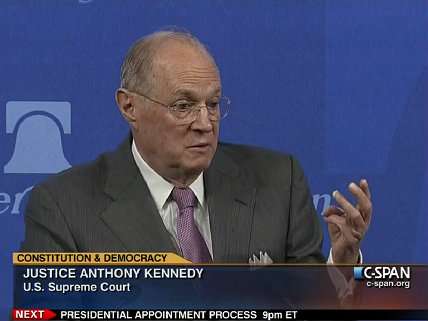Federalism and Liberty in the Supreme Court's Gay Marriage Cases

In his majority opinion today invaliding Section 3 of the 1996 Defense of Marriage Act, Justice Anthony Kennedy employed two of the most common themes in his jurisprudence: federalism and liberty. Beginning first with the observation that "the Federal Government, throughout our history, has deferred to state-law policy decisions with respect to domestic relations," Kennedy explained how DOMA's requirement that the federal government refuse to recognize a valid same-sex marriage from a state served to upset that longstanding federalist balance.
"The significance of state responsibilities for the definition and regulation of marriage dates to the Nation's beginning," he continued, strongly suggesting that DOMA might be invalidated on federalism grounds alone.
But then he pivoted. "It is unnecessary to decide whether this federal intrusion on state power is a violation of the Constitution," he wrote. That's because DOMA's infringement on the 5th Amendment is itself so severe. "Though Congress has great authority to design laws to fit its own conception of sound national policy, it cannot deny the liberty protected by the Due Process Clause of the Fifth Amendment."
In other words, the government overreached and liberty suffered. "The principal purpose and the necessary effect of this law are to demean those persons who are in a lawful same-sex marriage," he wrote. As a result, DOMA must fall. Kennedy adopted a similar approach in 2003 when he invalidated Texas' ban on homosexual conduct in the case of Lawrence v. Texas, a decision handed down 10 years ago today. "Liberty presumes an autonomy of self that includes freedom of thought, belief, expression, and certain intimate conduct," he declared at the outset of that case, before striking down the law as an illegitimate exercise of government power.
Many gay rights advocates had hoped for a similar ruling by Kennedy this morning against California's Proposition 8, the voter initiative banning gay marriage in that state. But a majority of the Supreme Court opted instead to stay clear of the pressing question of whether or not Prop. 8 violates the Constitution by ruling only on a procedural matter, thereby sending the dispute back to California and avoiding a sweeping constitutional decision one way or the other. In his dissent today in that case, Kennedy argued that the Supreme Court was wrong to avoid reaching the merits, but gave no indication of how he might ultimately vote if it did so. He reserved the word liberty for his DOMA decision alone.


Show Comments (37)